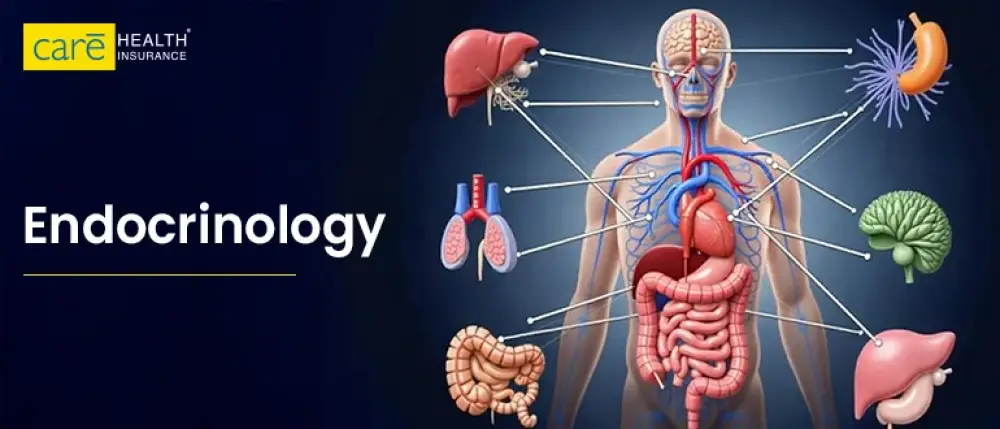Subscribe to get weekly insights
Always stay up to date with our newest articles sent direct to your inbox
Published on 1 Apr, 2025
Updated on 1 Apr, 2025
80 Views
6 min Read

Written by Ritika Malik
Reviewed by Munmi Sharma
0Like
Be the First to Like
Did you know the human body communicates through chemical indications, adapting everything from mood swings to metabolism? These signals happen daily through the endocrine system, also known as endocrinology. Hormones, the silent messengers that control critical body functions, are at the heart of this intriguing field. But what transpires when something is not right with this communication system?
When these hormone signals are not in place, the balance in the body is disrupted, causing several endocrinological diseases. It is crucial to understand how endocrinology affects our health and in what ways we can address hormonal imbalances through adequate endocrinology treatment. We will explore everything related to endocrinology to understand this unique field of medicine better.
Endocrinology is a field of medicine that studies the endocrine system, which controls hormonal imbalances in the body. It involves glands responsible for producing and secreting hormones. These hormones control crucial bodily functions like metabolism, growth, development, sexual function, tissue function, and mood swings.
Hormones are essential chemical substances released by endocrine glands. They travel through the bloodstream to organs and tissues, indicating that they execute particular functions. Hormones control all bodily functions, from metabolism and immune response to development and reproduction. An adequate balance of hormones is essential to ensure good health.
Determining the symptoms of hormonal imbalances is crucial to receiving treatment for endocrinological diseases in the endocrinology department. The symptoms might differ depending on which hormone is impaired but usually involve:
Endocrinology works by comprehending how these hormones communicate with the body's cells and organs to preserve balance. Here's how the endocrinology works:
Here are the key components of the endocrine system:
Endocrinological diseases occur due to imbalances in hormonal production or function. These imbalances deeply influence bodily functions like growth, metabolism, and well-being. Here are some of the most common endocrinological diseases that occur due to hormone imbalance:
In endocrinology, several diagnostic tools help assess hormonal imbalances and identify the underlying cause. Here are these tools:
Saliva Tests help measure hormones like cortisol and progesterone to evaluate the function of the adrenal glands and other endocrine glands.
Bone Density Test assesses the risk of osteoporosis and bone fractures in individuals with hormone concerns.
Blood Tests help measure several thyroid hormones (T3, T4, TSH), sex hormones (estrogen, progesterone, testosterone), insulin, cortisol, and growth hormone.
Urine Tests measure hormone levels, mainly for cortisol or adrenal hormones.
Genetic Testing helps identify inherited conditions that impact hormone production, such as congenital adrenal hyperplasia or certain forms of polycystic ovary syndrome (PCOS).
Imaging Tests (Ultrasound, CT Scan, MRI) help detect tumours or irregularities in endocrine glands like the thyroid, adrenal, or pituitary glands.
Stimulating or Suppression Tests evaluate how the endocrine system responds to certain stimuli. They assess insulin function or use a TRH (thyrotropin-releasing hormone) stimulation test to evaluate pituitary function.
Adequate endocrinology treatment is crucial to reviving balance and enhancing the quality of life for people experiencing endocrinological diseases. Treatments vary from hormone replacement therapy to lifestyle modifications and, in severe cases, surgical interventions.
Treating endocrinology disorders requires constant care, including expert consultation, medications, therapies, lab tests, and sometimes surgeries. The cost of addressing severe hormone disorders can be lofty, and without insurance, anyone can experience financial burdens or even overlook necessary treatment. Here, the right health insurance plan guarantees that patients have access to the comprehensive care they require, lowering the risk of complications, facilitating better health outcomes, and making treatment more reasonable and convenient.
Metabolism is a biochemical process that transforms food into energy. Hormones secreted by endocrine glands like the thyroid and pancreas significantly impact metabolism. Disruptions in metabolism can result in various metabolic disorders, including diabetes and thyroid disease.
Taking care of your endocrine system is paramount for lasting health. A healthy lifestyle helps sustain endocrine glands' efficient excretion of hormones and avert endocrinological diseases. Here are some tips for maintaining a healthy endocrine system:
Endocrinology is the basis of modern medicine, enabling us to comprehend how hormones control every facet of our health. Whether addressing metabolism, controlling endocrine glands, or diagnosing endocrinological diseases, endocrinology is essential in preserving balance within the body. If you doubt a hormonal imbalance, don't hesitate to contact an endocrinologist to ensure your endocrine system is functioning optimally.
>> Also Read: Endocrine System: Definition, Function, and Parts
Disclaimer: Plan features, benefits, coverage, and claims underwriting are subject to policy terms and conditions. Kindly refer to the brochure, sales prospectus, and policy documents carefully.
Be the First to Like
शुगर कंट्रोल कैसे करे? जानें, डायबिटीज में क्या खाना चाहिए Care Health Insurance in Health & Wellness
Thyroid : मामूली नहीं हैं महिलाओं में थायराइड होना, जानें इसके लक्षण और घरेलू उपचार Care Health Insurance in Diseases
हाई ब्लड प्रेशर को तुरंत कंट्रोल कैसे करें? देखें इसके उपाय Care Health Insurance in Diseases
प्लेटलेट्स की कमी के लक्षण, कारण और इलाज क्या है Care Health Insurance in Diseases
What Is IBS? Signs, Triggers & Solutions That Work Care Health Insurance in Diseases
Do People with Mental Illness Have Less Heart Disease? Care Health Insurance in Diseases
एक्जिमा क्या है? देखें, इसके लक्षण और इलाज Care Health Insurance in Diseases
Guillain-Barré Syndrome (GBS): Causes, Symptoms and Treatment Care Health Insurance in Diseases